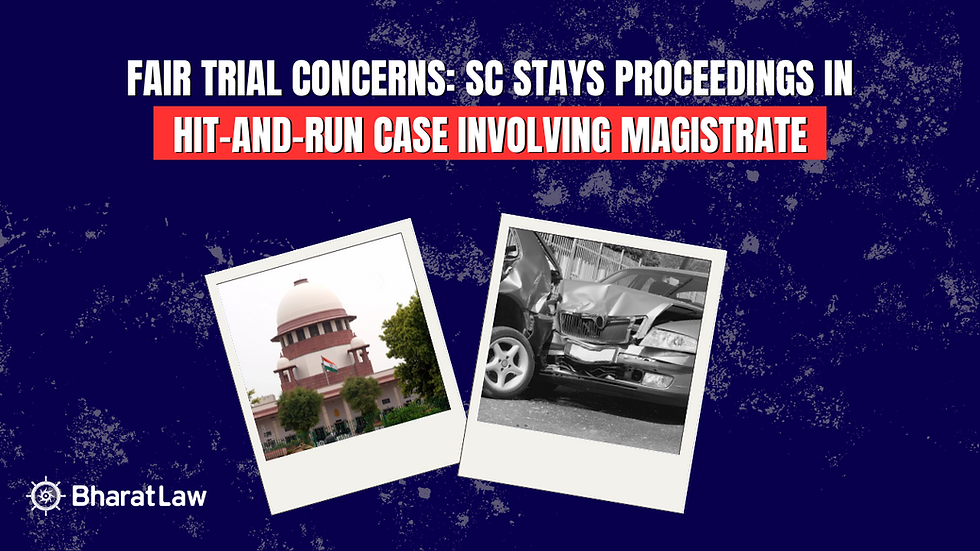TDR Rights Must Be Granted as Fair Compensation: Supreme Court Upholds Landowners' Entitlement in Urban Development
- Chintan Shah

- Sep 17, 2024
- 4 min read
Summary of the Judgment
Case Name: Kukreja Construction Company & Others vs State of Maharashtra & Others
Date: September 13, 2024
Court: Supreme Court of India
Judges: Hon'ble Justice Nagarathna and others
Advocates:
Senior Counsel for the Appellants: Mr. Pravin Samdani
Senior Counsel for the Respondents: Mr. Nadkarni
Acts and Sections Involved:
Maharashtra Regional and Town Planning Act, 1966 (MRTP Act)
Development Control Regulations (DCR) for Greater Mumbai, 1991
Sections 126(1)(b) of the MRTP Act
Relevant Circulars: Circular dated 09.04.1996, Circular dated 05.04.2003
Cited Judgments:
Godrej & Boyce Manufacturing Company Limited vs State of Maharashtra (2009) 5 SCC 24 (“Godrej & Boyce I”)
Municipal Corporation of Greater Bombay vs Natwar Parikh & Co. Pvt. Ltd, Civil Appeal No.1748 of 2015
Starwing Developers Private Limited vs Municipal Corporation of Greater Mumbai, Writ Petition No. 2531 of 2009
Introduction
The Supreme Court's ruling in Kukreja Construction Company & Others vs State of Maharashtra & Others addresses a significant issue in urban development law, particularly concerning the rights of landowners to receive compensation in the form of Transferable Development Rights (TDR) or Floor Space Index (FSI) for land surrendered under the Maharashtra Regional and Town Planning Act, 1966 (MRTP Act) and the associated Development Control Regulations (DCR).
Key Legal Findings
1. Interpretation of Section 126(1)(b) of the MRTP Act
The crux of the case involved interpreting Section 126(1)(b) of the MRTP Act, which allows for compensation in the form of FSI or TDR. The appellants argued that this section entitles them to 100% TDR, not only for the land surrendered but also for the additional area used to develop the public amenities (in this case, roads) at their own expense.
In Godrej & Boyce I, the Supreme Court had earlier held that landowners or lessees who construct amenities on their land at their own cost are entitled to TDR equivalent to 100% of the area developed. The court clarified that under the MRTP Act and the unamended DCR, owners were entitled to this compensation without any restriction to a percentage of the land, such as the 15% or 25% limits suggested by the Mumbai Municipal Corporation's earlier circulars.
The current ruling reaffirmed the decision in Godrej & Boyce I, emphasizing that TDR should be granted as a form of compensation when land is acquired for public purposes, which includes the development of amenities. The court noted:
"The scheme of additional 100% TDR on account of construction of an amenity was in lieu of payment of compensation in an acquisition proceeding."
This recognition underscores the court's consistent approach towards ensuring fair compensation for landowners who bear the burden of developing public infrastructure.
2. Prospective or Retrospective Application of Amendments
The court was asked to determine whether the 2016 amendments to the DCR, which significantly altered the TDR and FSI compensation schemes, could be applied retrospectively to nullify rights already vested under previous regulations. Specifically, the notification dated 16.11.2016 introduced new limitations, reducing the scope of TDR entitlements for amenities constructed by landowners.
The Supreme Court ruled that the amendments could not be applied retrospectively. In line with constitutional principles, the court held:
“The notification dated 16th November 2016 is legal and valid. However, the said notification will not have retrospective or retroactive application to a land reserved under the development plan which is surrendered and amenity is developed on the said land by the owner or lessee thereof at his own cost prior to 16th November 2016.”
Thus, the vested rights of landowners who had completed their developments before the 2016 amendments were protected. This decision is a critical reaffirmation of the principle that statutory amendments cannot operate to deprive parties of rights already accrued under earlier laws.
3. Delay and Laches
A substantial number of writ petitions were dismissed on the ground of delay, with the High Court holding that the petitioners had waited too long to claim their TDR entitlements. The appellants contended that such delays should not have precluded their claims, as the failure to provide TDR amounted to a continuing breach of their rights under the MRTP Act.
The Supreme Court took a nuanced approach, recognizing that while delay could be a valid ground for denying relief, each case must be judged on its own merits. The court upheld some of the High Court's dismissals but allowed others, acknowledging that the petitioners’ conduct and the facts of each case warranted different outcomes. The judgment held:
"Whether the writ jurisdiction of this Court under Article 226 of the Constitution of India can be allowed to be invoked on the basis of the said decision or not depends upon the facts of each case and the conduct of the petitioners especially the delay and laches on their part."
Conclusion
The Supreme Court’s decision in Kukreja Construction Company & Others vs State of Maharashtra & Others is a critical judgment for landowners, developers, and municipal authorities involved in urban development and planning. The ruling upholds the right to fair compensation for land surrendered for public purposes and reaffirms the applicability of Godrej & Boyce I, particularly in terms of compensating landowners with 100% TDR for amenities developed at their expense.
It also highlights the judiciary's consistent stance that statutory amendments, such as those to the DCR, cannot operate retroactively to take away vested rights. Finally, the court's treatment of the issue of delay and laches signals a flexible approach, ensuring that the facts and conduct of each case are thoroughly considered before denying relief on procedural grounds. This judgment serves as a guide for future cases involving similar issues under the MRTP Act and DCR, reinforcing the principles of fairness, equity, and constitutional protection of property rights.



Comments